OUR TEAM
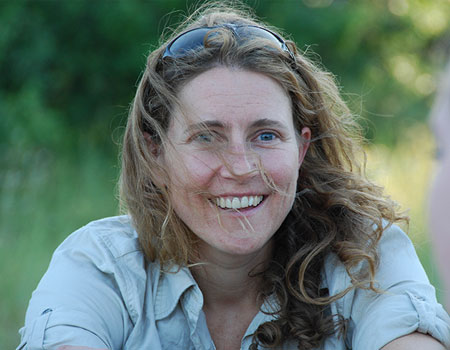
Dr Kate Evans
(Founder & Director of Research)
(Founder & Director of Research)
Dr Kate Evans is the Founder & Director of Research of Elephants for Africa. She is an award-winning behavioral ecologist and conservation biologist who conducted her PhD ‘The behavioral ecology and movements of adolescent male African elephant in the Okavango Delta, Botswana’ through the University of Bristol. Her interest in male elephants has expanded to focus on the social and ecological requirements of male elephants in the context of a human landscape.
She continues to be inspired by the wilderness of Botswana and is passionate about conserving African savanna elephants.
Kate is the Project Coordinator of the Gothenburg Global Biodiversity Centre, and was award an Honorary Doctorate in Science from the University of Swansea.
She continues to be inspired by the wilderness of Botswana and is passionate about conserving African savanna elephants.
Kate is the Project Coordinator of the Gothenburg Global Biodiversity Centre, and was award an Honorary Doctorate in Science from the University of Swansea.
- In 2010 Elephants for Africa won the Best Research Award from Wetnose.
- In 2011, Kate Evans and Elephants for Africa won the George B Rabb Conservation Medal from the Chicago Zoological Society.
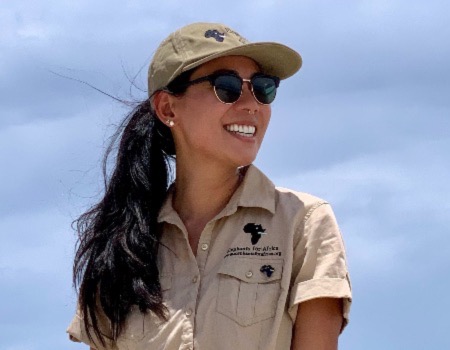
Ms Stephanie Kong
(Managing Director)
(Managing Director)
Stephanie Kong is the Managing Director of Elephants for Africa. Born and raised in the San Francisco Bay Area in California, Stephanie has a diverse background in international research, education, conservation, and consulting. She brings a wealth of experience and expertise to the organization and is committed to positively impacting the future of African elephants and rural Motswana communities.
She earned her Bachelor’s degree in Environmental Science and later completed a Master’s, where she studied seabird conservation and island restoration in New Zealand. Most recently, she was a biologist at an environmental consulting firm in California and assisted research efforts in Kruger National Park in South Africa. In her off time, she loves going on safari and improving her photography.
With a deep passion for preserving the natural world, Stephanie is excited to lead EfA and oversee the diverse research and community initiatives, and ensure that EfA’s programs are successful, impactful, and sustainable.
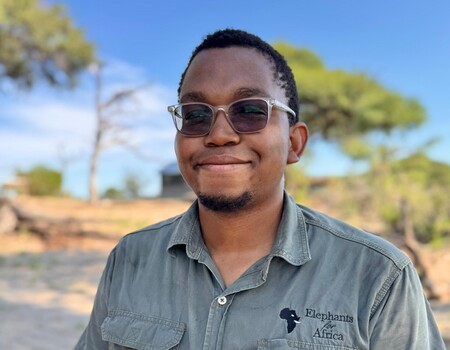
Mr Walona Sehularo (Community Projects Manager)
Born and bred in the gateway of the Okavango Delta, our Community Projects Manager, Walona Burkie Sehularo, never dreamt he’d one day be involved with conservation. His love of nature was first stoked as he stood at the banks of a river in the remote village of Qangwa, watching the once dry riverbed fill up and flood within a matter of minutes. Whilst not his first choice in subjects he found himself at the Botswana College of Agriculture, studying Forestry and Range Ecology.
The disciplines of forestry and ecology soon captivated him (he used to jokingly told his friends that he was training to become a professional tree hugger). This love for his studies soon bred devotion to the cause of conservation. The education, skills and knowledge he had acquired during his studies made it clear to him, more needs to be done to preserve the natural heritage of Botswana and the onus was not on someone else but on him to make those changes. It was this determination and passion that finds himself part of our team at Elephants for Africa and leading our Community Coexistence Program.
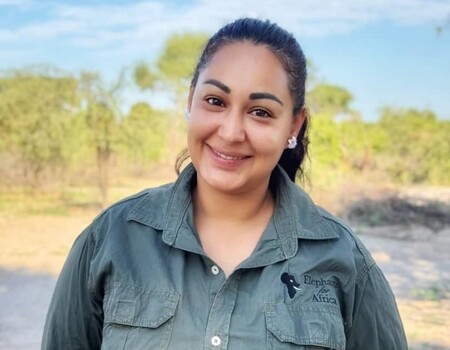
Ms Gretchen Metzler
(HR Administrator)
(HR Administrator)
Gretchen, our Administrator, brings a wealth of experience and a unique background to the EfA team. Born in Francistown, educated in Namibia, and previously living near the Mamuno Border Post (Botswana) and in Maun, she has immersed herself in diverse cultures and perspectives throughout her life. As an accomplished administrative professional with expertise in human resources, Gretchen combines her skills with a deep love for both people and animals. This passion, inspired by her childhood dream of becoming a veterinarian, reflects her lifelong commitment to seed positive impact. Her warm, easy-going nature and adaptability make her a perfect fit for the EfA team. Gretchen is eager to apply her skills, enthusiasm, and fresh perspective to support the overall success of Elephants for Africa.

Mr Thatayaone Motsentwa
(Research Officer)
(Research Officer)
Thatayaone joined the field research team in 2017 having been employed as a Chilli Plot Assistant for our Community Coexistence Project in the village of Khumaga. With an Associate Degree from Limkokwing University and his obvious dedication and passion to his work, it soon became evident that his skills and knowledge were not being to put to the best use in this role and we were keen to give him an opportunity to gain experience in the field to feed his passion for conservation. Since then he has flourished and now heads up our field research team.
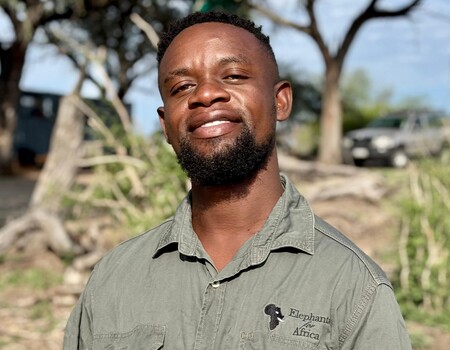
Mr Boemo Lekang
(Project Assistant)
(Project Assistant)
Boemo is a talented and dedicated individual who joined Elephants for Africa as a Government sponsored volunteer in 2022 as part of their GSV (Government Scheme Volunteer) program. Originally from the village of Moreomatao, he brings with him a wealth of knowledge and experience, having recently graduated from ABM University in Gaborone with an Honours in Tourism and Hospitality Management.
Since joining the team, Boemo has proven to be a valuable asset, lending his skills to a variety of projects and initiatives. He is particularly interested in the relationship between the environment and small rural communities and has played an important role in our research and community outreach programs.
Boemo is known for his strong work ethic and his willingness to jump in wherever or wherever he is needed. He is a valuable member of the team and is sure to make a positive impact in his work at Elephants for Africa.
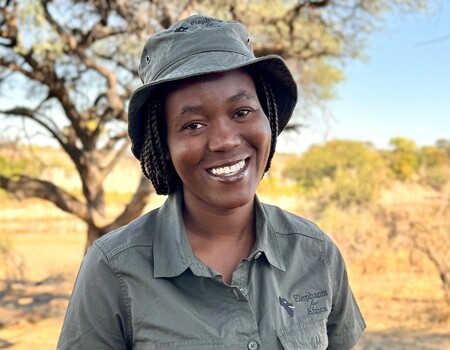
Ms Kemoneetswe Mphanyanee
(Education Officer)
(Education Officer)
Kemoneetwe is from the village of Moreomaoto and heads up our School's Education programme, bringing lively and interesting hands-on activities to the Environmental Clubs in our five regional partner schools.
She is passionate about educational development and ensuring children have a better future by laying a good foundation in their early school life.
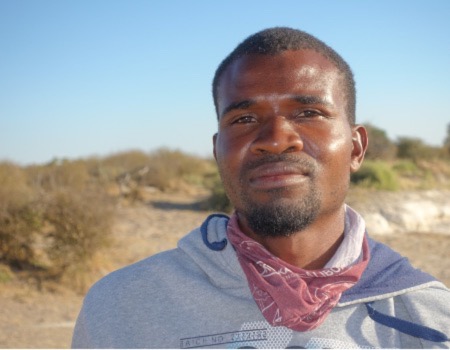
Mr Tathego Bolekanye
(Community Officer)
(Community Officer)
Mr Tathego Bolekanye is a young and motivated conservationist who is our Community Officer for his village of Moreomaoto. Having been born and raised there, he understands the challenges and benefits of living in his community and is, therefore, an excellent person for this vital role.
His appointment marked an inflexion point in the growth of our farmer-focused Community Coexistence Project as we expand the programme outside of the village of Khumaga.
He works with the community to mobilise people to actively participate in the projects we run in Moreomaoto for the benefit of the community and the conservation of the endangered African savannah elephant.
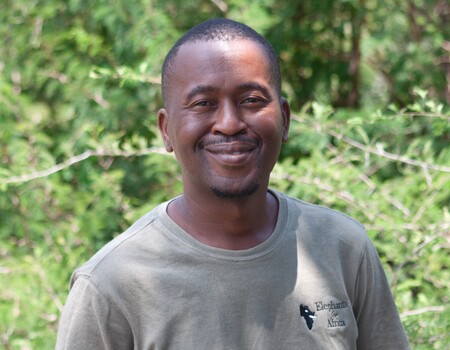
Mr Letshabo Ramakhubu
(Community Officer)
(Community Officer)
Letshabo is from the village of Rakops where he serves as Community Officer. He has hands-on experience in farming and thus understands the challenges local farmers face each season. He is passionate about promoting coexistence between farmers and elephants.
As a Community Officer for Elephants of Africa, Letshabo sees the opportunity to help both his community and these magnificent creatures, elephants. His skills in instrumentation aid in the maintenance of solar-powered electric fences and exploring other innovative solutions, such as using ultrasound sirens and strobe lights to deter elephants. He also advocates for educating communities on animal behaviour and promoting eco-tourism, which can benefit both the local economy and wildlife conservation.
Letshabo firmly believes that coexistence between farmers and elephants is not just a dream but an achievable reality. He works hard towards this goal through his skills and passion, making a tangible difference for his community.
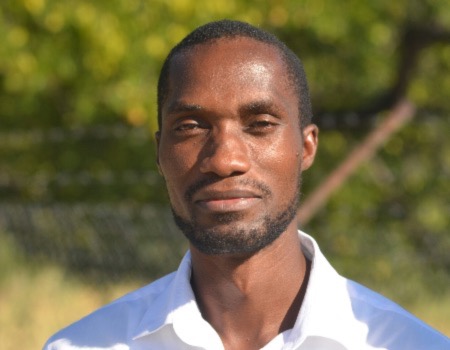
Dr Hesekia Garekae
(Elephant Ambassador)
(Elephant Ambassador)
Hesekia joined us as our Community Coexistence and Education Coodinator in 2020, having completed his PhD studies in Environmental Science at Rhodes University, South Africa, he took up the wonderful opportunity of a Postdoc at the University of Cape Town.
He continues his affiliation with Elephants for Africa as our Ambassador.
Hesekia is passionate about community development and aspires to make a significant mark in the lives of rural people, who depend on natural resources as a source of livelihood, by developing innovative and sustainable resource management and conservation strategies. Therefore we value is insight and experience as we build our work in this area.
ASSOCIATED STUDENTS
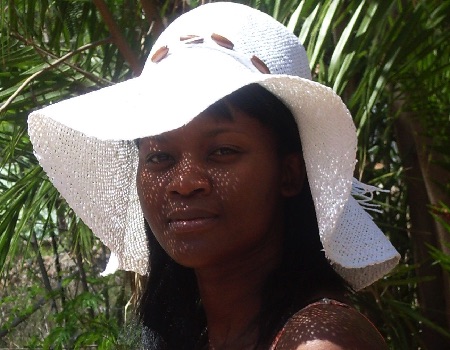
Miss Masego Mokobela
(PhD student, Nelson Mandela University)
(PhD student, Nelson Mandela University)
A previous employee of Elephants for Africa, Masego left to pursue her PhD at Nelson Mandela University, in South Africa. Her study is on the recolonisation of elephant of the Makgadikgadi Pans National Park population after a period of absence. She is focused on understanding how elephants, as megaherbivores, influence and affect biodiversity. Particularly given that the elephant population in MPNP occurs at low densities and in an open system. This presents a globally unique opportunity to study megaherbivore release and habitat selection in an expanding population. The collapse and recovery of elephants in the Makgadikgadi ecosystem will give us insights on how the presence and absence of megaherbivores impacts vegetation and potentially other species. Moreover, it will further highlight the importance of maintaining intact ecosystems with all guilds represented. Lessons learnt will also guide management of ecosystems where such megaherbivores have been lost such as in Europe and America.
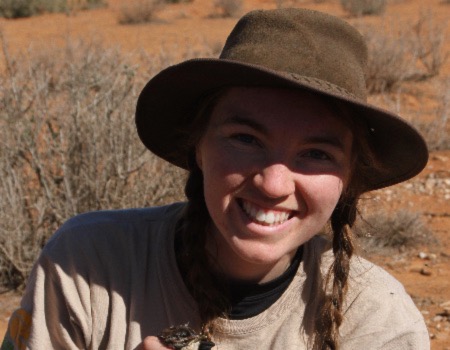
Miss Helen Mylne
(PhD Student, University of York)
(PhD Student, University of York)
Helen’s fascination with African elephants began in 2016 during her undergraduate placement year in Zambia and Zimbabwe. She later went on to a position studying the elephants of the Zambezi National Park near Victoria Falls. There she helped to set up and run a new project investigating the distribution, demography, and impact of elephants on the National Park, with plans to expand the investigation into crop-foraging in the local communities.
After completing a Master’s in animal behaviour and communication at the University of Exeter, Helen started her PhD at the University of York with Elephants for Africa in July 2021. Her research investigates the social network structure of male elephants and how individual age affects their importance in the network. She has so far been working on a statistical analysis of nine years of EfA sightings data and will soon be starting a genetic analysis of grouping patterns and some social learning experiments.
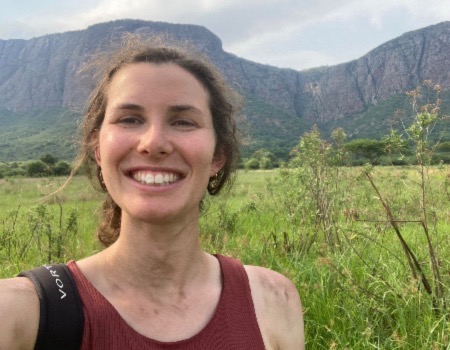
Miss Penny Downes
(PhD Student, Bangor University)
(PhD Student, Bangor University)
Penny is a PhD student at Bangor University funded by the NERC Envision Doctoral Training Partnership. Through studying Anthropology and Biology at Durham University, she developed an interest in human-wildlife interactions. Her subsequent Master of Research project at Imperial College London looked at the ecological drivers of Asian elephant movement to identify human-elephant conflict hotspots. This led her to a research assistant position in South Africa, where she managed a project investigating how energy availability of crops and natural vegetation drives chacma baboon crop-foraging. Using her skills in ecological and social science research, her PhD project will investigate the socio-ecological drivers of human-elephant interactions along the western boundary of the Makgadikgadi Pans National Park. Through this, she hopes to inform targeted management strategies that will work to reduce human-elephant contact and foster coexistence.
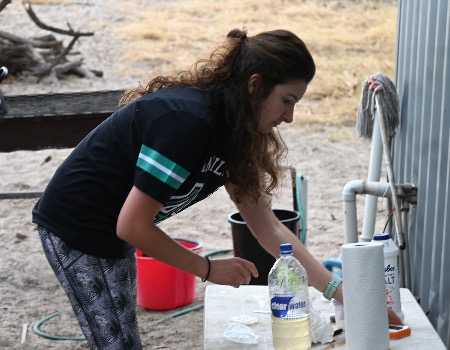
Miss Isabella Endacott
(PhD student, Liverpool University)
(PhD student, Liverpool University)
Isabella is a PhD student at the University of Liverpool funded by the BBSRC, and is working with EFA as her project partner. As part of her PhD Isabella has spent several months on placement with the team, alongside carrying out her fieldwork in Khumuga, the Makgadikgadi Pans National Park, and other sites across Northern Botswana.
Isabella’s research focus lies in veterinary epidemiology, with her interest in this field founded on an undergrad in Zoology and a Masters in One Health and infectious diseases; during which she investigated livestock-wildlife virus transmission in the Maasai Mara, Kenya. Since then she has worked across Sub-Saharan Africa on both conservation projects and livestock health research. Isabella’s PhD has now allowed her to utilise these diverse experiences and follow her key interests by studying parasite transmission between livestock and wildlife that share natural resources. Through working with local communities, and conducting extensive fieldwork in Botswana’s National Parks she will explore parasite abundance and diversity across different wild, and domestic ungulate species. Isabella hopes to share her findings with local stakeholders to inform on parasite spillover risks to and from livestock, and to guide strategies that benefit both livestock health, and wildlife conservation efforts.
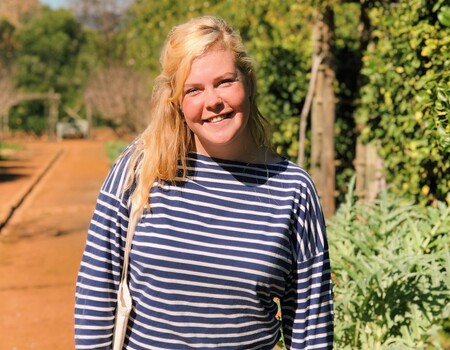
Miss Lynn Kleinjan
(Masters student, Gothenburg University)
(Masters student, Gothenburg University)
Lynn Kleinjan, is a Master’s student from The Netherlands in Conservational Biology at Gothenburg University, Sweden. Her research focused on African savannah elephants (Loxodonta africana) and their movement patterns in the Makgadikgadi Pans National Park, Botswana.
Using camera trap data, she analyzed how elephants adjusted their walking speed and movement behavior in response to environmental and potential anthropogenic pressures. Understanding these dynamics is crucial for developing better strategies to mitigate human-elephant conflict.
Although she wasn’t able to conduct fieldwork in Botswana as originally planned, Lynn is excited to contribute valuable insights using existing datasets. Her goal is to help improve conservation efforts and promote coexistence between elephants and local communities.
PREVIOUS STUDENTS
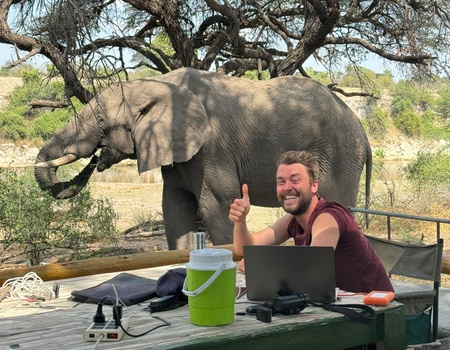
Mr Simon Isaksson
(Masters 2024, Gothenburg University)
(Masters 2024, Gothenburg University)
In his younger years, Simon Isaksson dreamt about playing football on the grass of Camp Nou in Barcelona. In time, reality found him and led him down the path of a new passion in life, the one of nature and biology.
His studies at the University of Gothenburg was concluded by joining the team in the Makgadikgadi for his Masters thesis from January 2024 - May 2024. Here, Simon used photo identification to study movement patterns and social dynamics of the bulls in the park. In complement to his studies, Simon enjoys spending time in nature doing wildlife photography and wishes to use this to share his fascination and contribute to the conservation of the wild
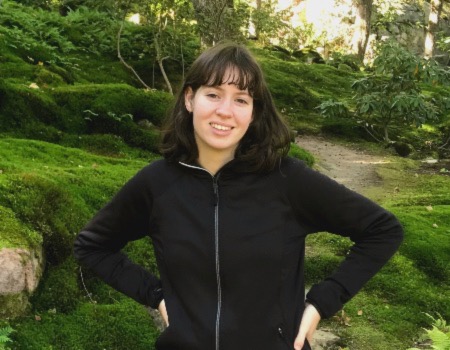
Miss Vera Ruijs
(Masters 2023, Gothenburg University)
(Masters 2023, Gothenburg University)
Originally from the Netherlands, she completed her bachelor’s degree in biology at Wageningen University with a focus on adaptation and development. Eager to experience more of the world, she enrolled for her Masters in Sweden, where she quickly developed a fascination with large mammals, especially the African savanna elephant.
For her Masters she was motivated to add a new tool in the box to address human-elephant conflict, building upon Connie Allen’s previous PhD work with Elephants for Africa. Vera tested if established elephant pathways can be manipulated and moved using olfactory cues such as elephant urine.
Her research was sponsored by Dieren Park Amersfoort Wildlife Fund https://wildlifefund.nl/en/
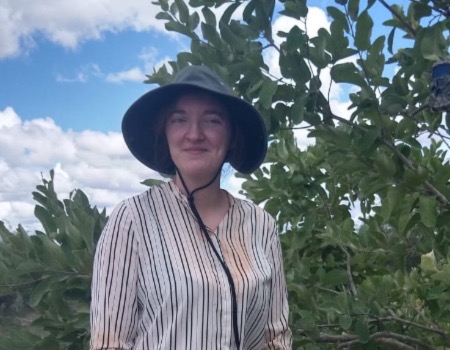
Miss Rebecka Relfsson
(Masters 2023, Gothenburg University)
(Masters 2023, Gothenburg University)
Rebecka Relfsson was enrolled in the Nordic Masters program in Biodiversity and Systematics at Gothenburg University in Sweden for her Masters on 'African elephants' effect on the temporal use of elephant highways by predator and prey'.
When not studying, she worked as a guide and camp leader at an animal conservation park that specializes in the conservation and breeding of endangered animal species.
Her favourite part of biology is behavioural ecology, and her dream is to combine ethology with applied conservation biology.
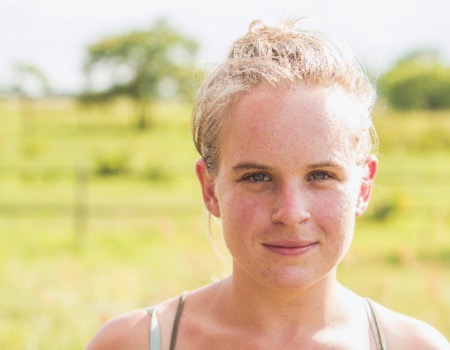
Miss Geke Woudstra
(Masters 2023, Norwegian University of Life Sciences)
(Masters 2023, Norwegian University of Life Sciences)
Geke first found her love for Africa and conservation on a volunteer trip to Madagascar. Afterwards, she perused a Bachelor’s degree in Tropical Forestry before continuing with Tropical Ecology for her Master’s degree. During her studies, she learned that her main interest lies with animal and plant interactions.
Geke studied how the physical condition and age of male elephants influenced feeding behaviour and species selection of vegetation.
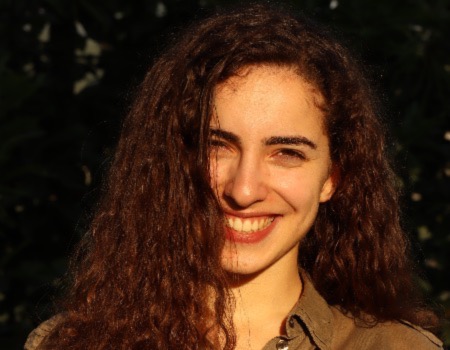
Miss Ana Raquel Sales
(Masters 2022 , Universidade de Aveiro)
(Masters 2022 , Universidade de Aveiro)
Portuguese student, Ana Raquel Sales excelled during her Masters securing 19/20 from Universidade de Aveiro. Her Masters study 'Dancing for the elephants' combined her passion for wildlife and dance, bringing a unique perspective to raising awareness and generate interest and empathy for the African elephant.
Please contact info@elephantsforafrica.org for more information about this work.
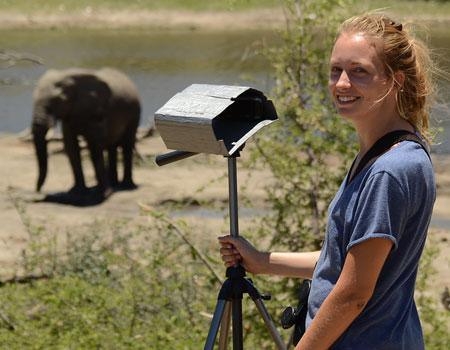
Miss Connie Allen
(PhD 2022, University of Exeter)
(PhD 2022, University of Exeter)
Connie Allen Wild conducted her PhD research in the Makgadikgadi Pans National Park, Botswana, focusing on the complex social dynamics of male African elephants. Using focal animal sampling and camera trap surveys, her study uncovered significant behavioral differences among male elephants of various ages. This groundbreaking research earned her the prestigious MDPI Animals Thesis of the Year award in 2022. Through her work, Connie has contributed valuable insights into the behaviour and social structures of male elephants.
She continues her research into the social life of elephants, read more here http://www.connieallen.net
